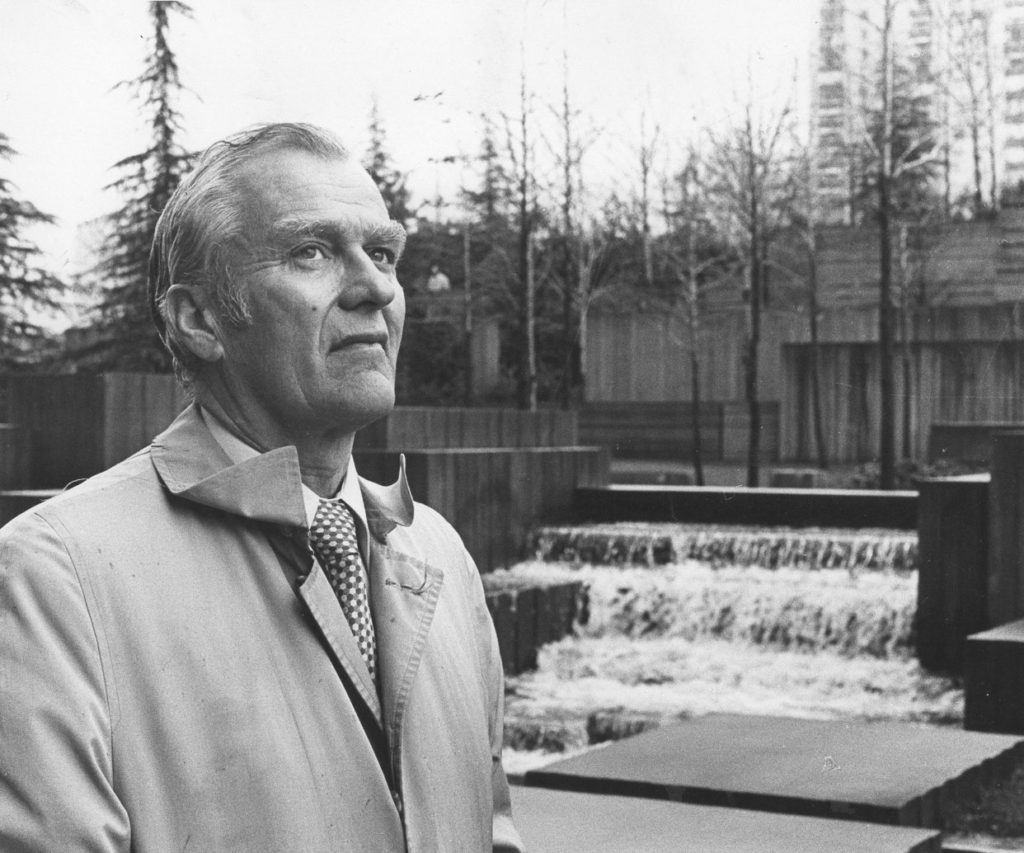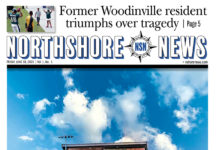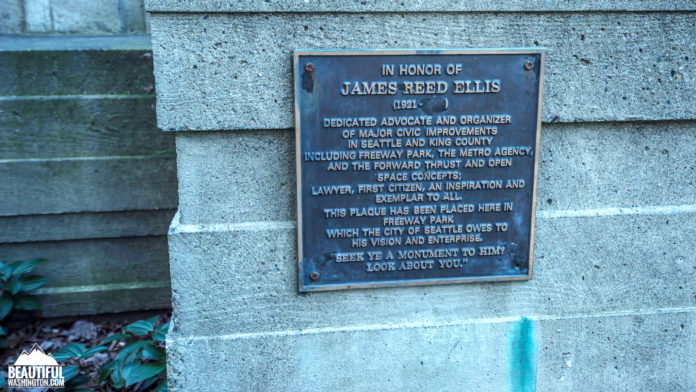Pub. Note: The runaway winners in our poll on the proposed ways to honor the late civic leader Jim Ellis were renaming the Mountains to Sound Greenway and the Washington State Convention Center in his honor. We think both are appropriate and well-deserved. Here are the letters we sent to Jon Hoekstra, executive director of the Greenway Trust, and Frank Finneran, president of the Washington State Convention Center Board of Directors.
Dear Jon: I’m certain that you and the other Mountains to Sound Greenway Board members are considering an appropriate memorial for your founder, the late Jim Ellis. Naming the Greenway in his honor is an obvious choice.
We’ve been running a series of articles about Jim’s many contributions to the Northwest community on our marketingnw.com website. We ended with a survey of various memorial ideas, and naming the Mountains to Sound Greenway and the Washington State Convention Center (which Jim also founded) in his honor were the runaway winners.
Please share this message with other Board members. We look forward to hearing what you decide.
Dear Frank: I’m certain that you and the other members of the Washington State Convention Center Board of Directors are considering an appropriate memorial for your founder, the late Jim Ellis. Naming the Convention Center in his honor is an obvious choice.
We’ve been running a series of articles about Jim’s many contributions to the Northwest community on our marketingnw.com website. We ended with a survey of various memorial ideas, and naming the Washington State Convention Center and the Mountains to Sound Greenway (which Jim also founded) in his honor were the runaway winners.
Please share this message, and the following one from former Seattle City Councilmember Jean Godden, with the other Board members. We look forward to hearing what you decide.
Dear Frank: It’s my great hope that you and the Board members of the Washington State Convention Center will consider renaming the center after the late Jim Ellis. I can think of no more appropriate way of honoring Jim’s many contributions to the Puget Sound region and the state.
I was a member of the Seattle Post-Intelligencer’s editorial board on the day Jim met with us and suggested placement of a convention center over the I-5 freeway. It was a novel and controversial idea at the time. Many local leaders were pushing for siting at the Seattle Center and other possibilities (the waterfront, etc.) However, Jim argued for locating the convention center close to the center of the city and near hotel accommodations and retail shopping. Looking back at his choice of locales, next to Freeway Park and convenient to I-5 exits, one can see that this proved a brilliant and (now of course) obvious choice.
I hope the Board will realize how much that decision and Jim’s subsequent work to complete the center has meant to the state and city. How fitting it would be if the Board decides to change the Washington State Convention Center (a generic name at best) to Jim Ellis Center.
My thanks to you for your consideration,
Jean Godden
Former City Councilmember and city columnist
Jean Godden Remembers ‘Sewer’ Ellis
Pub. Note: Jean Godden, a voice dearly missed on the Seattle City Council these days, a former columnist for both the Seattle P-I and The Seattle Times and the author of “Citizen Jean,” shares her remembrances of Jim Ellis. At the end, check out her suggestion for a fitting memorial to Jim. Also, check out the prescient interview—in view of today’s divisiveness—that my friend, Paul Casey, did with Jim on his Profiles of Experience radio show 23 years ago.
Jim Ellis was someone who had large dreams and—to this region’s everlasting benefit—he made them happen. We have Jim to thank for civic triumphs, ranging from cleaning up Lake Washington, then a sewer-filled cesspool, to preserving a greenway stretching from Seattle to Ellensburg.
Along the way, he championed Forward Thrust, a package of initiatives that gave us parks, pools, an aquarium, roads and the Kingdome. He pushed for better Metro transit service. He built a convention center and Freeway Park on a lid over I-5 through the heart of the city. And he worked to preserve the region’s farmlands and quality of life.
Along the way, there were a few disappointments, none sadder than the dual rejection of a rail-rapid-transit system. That system would have been built with 90-percent federal support. Instead, those funds went to Atlanta. But even while losing out, it was Jim’s vision that led to the formation of Sound Transit.
Jim Ellis never ran for office. Instead, he believed in devoting one third of his waking hours to work, one third to family and one third to community. He was a trailblazer, the undisputed “Father of Metro.” He spearheaded projects with wit, charm and persuasiveness. I met him many times when he promoted his visions, lobbying the Seattle Post-Intelligencer editorial board and—no doubt—any other opinion makers who would listen.
Newcomers sometimes confused Jim Ellis with his brother John, the man who headed Puget Sound Energy and was the Seattle Mariners CEO. Jim laughed over the confusion, saying, “He’s Lightbulb Ellis and I’m Sewer Ellis.”
Following Jim’s death, a Seattle Times editorial asked the question: “Can There Be Another Jim Ellis for Washington?” In these times, the answer is “probably not.” But we can be forever grateful that there was a Jim Ellis.
A celebration of life for Ellis will be held from 1:30 to 3:30 p.m. Dec. 8 at the Skybridge of the Washington State Convention Center. The family asks that, in lieu of flowers, any remembrances be sent to the Mountains to Sound Greenway Trust or to The 5th Avenue Theatre.
P.S. Jean’s suggestion for a memorial to Jim is “to rename the Washington State Convention Center—a clunky name—simply, the Ellis Center.” Again, we urge you to send your suggestions to larrycoffman@frontier.com, after which we’ll conduct a poll to determine our readers’ favorite suggestion.
P.P.S. And here is Paul Casey’s interview with Jim.

“He was a tremendous family man; he was a community leader and a visionary,” Robert Ellis said of his father, Jim Ellis, shown here at Freeway Park. (Seattle Times file, 1980)
By Larry Coffman
The Seattle area has lost the greatest civic leader in its history. And no one else is even close.
James Reed (Jim) Ellis died on Oct. 21 at the age of 98. But the legacies of his unparalleled civic contributions live on—from Freeway Park to King County Metro, from a feces-free Lake Washington to the Seattle Aquarium, from the fertile farmlands of South King County to the Mountains to Sound Greenway along I-90, and countless other civic projects.
The front-page Seattle Times obituary and his unusually long biography on History Link thoroughly cover all aspects of Jim’s remarkable life, including his disappointment over the double defeat of a proposed $1 billion rail-rapid-transit system in 1968 and again in 1970. I had the great privilege of working with Jim on transit matters for nearly two decades, beginning in 1967, and have some precious memories to share of my times with him.
I first got to know Jim when I was a reporter with The Seattle Times, covering the 13-part Forward Thrust capital-improvement program he had created and was spearheading. When the centerpiece of the program—the $1 billion Metro rail-rapid-transit system—failed at the ballot in 1968, he decided to refine the plan and resubmit it to the voters in 1970.
My coverage of Forward Thrust as a Times reporter culminated in an assignment to write the cover story on Jim for the Times’ Sunday Magazine, just before the Forward Thrust election in the Spring of 1968. It was a lengthy piece and, although he was very busy, Jim was generous with his time and quite forthcoming. I had no idea that, shortly thereafter, we would begin a working relationship.
As the “Father of Metro” and its legal counsel, Ellis had written the original legislation to give the agency additional powers, beyond the sewage-treatment function that had cleaned up Lake Washington. One of these was public transportation and, in the Summer of 1968, he activated the Metro transit function and began the search for its first employee.
I also had gotten to know Seattle Mayor Dorm Braman well through my coverage of Forward Thrust in general and the transit issue in particular, and the mayor was deeply involved in the transit issue. To my complete surprise, he and Jim offered me the Metro transit job, which led to this indelible memory…
I still can picture walking with Jim, past Deputy Mayor Ed Devine’s cluttered desk, and into the mayor’s office on the top floor of Seattle City Hall on a visit to pass muster with Mayor Braman. I only remember that the discussion was brief and that I left with the job—at about double my salary at The Times.
My primary responsibility as the Metro transit planning coordinator was to staff the Technical Advisory Committee that was refining the rail-transit plan for resubmission to the voters in 1970. The job included taking careful notes at each committee meeting…
After each meeting, I would go either to Jim’s Preston Thorgrimson Ellis law office, high up in the IBM Building, or to his home on the shore of Lake Washington in Bellevue, to review my notes with him. Jim was the only person I ever knew who edited copy by always adding to—rather than deleting—words in the text. But most importantly, I quickly learned how meticulous he was about the public record of our planning process.
During several of those visits to his home over the years, I was joined by daughter, Melissa, who was an avid stamp collector. When Jim learned of Melissa’s interest in stamps, when she was along, he would haul out his collection and do some trading, most often sitting on the living-room floor with her. That told me lots about Jim’s humanity.
Besides staffing the committee, my other big job was to visit the Bay Area and learn all I could about the BART rail-transit system, which was in its infancy and was the model for Seattle’s proposed system. A highlight was when we brought a BART car to Seattle Center, where Jim and several other dignitaries unveiled it at a promotional event. Unfortunately, the Boeing Bust coincided with the resubmission, and the issue again failed, enabling Atlanta to get the federal funds for its MARTA system that had been reserved for Seattle. Many call it the Seattle area’s worst-ever civic blunder.
Determined not to let transit die, Ellis then drafted bills that would make motor-vehicle-excise tax and sales-tax dollars available to fund transit, with voter approval. [Property taxes, requiring a 60% majority vote, had been the local-funding source for the rail plan; the two new sources would require only a simple majority.] My new job was as lead lobbyist of the bills in the 1971 state legislative session, with lots of help from Jim, Bob Gogerty and a prominent politician…
During the session, I would drive Jim to Olympia, sometimes several times a week, to testify on the bills. Often we were joined on the trip by political heavyweight Joel Pritchard. Joel was between jobs in a public-service career that saw him serve as both a Washington state and U.S. representative and lieutenant governor (along with being the inventor of pickleball!). It was amazing to watch Jim and Joel’s influence with legislators on both sides of the aisle, which resulted in the passage of both bills. [Joel was the first person I ever heard say, “You can accomplish anything if you don’t care who gets the credit.”]
I managed the subsequent election in 1972 to create the Metro Transit all-bus system, which received a 60+% majority, and was appointed the marketing manager. My contacts with Jim were less frequent after that, but I vividly remember four experiences…
The night of the bus-system election, Jim and I were in the cloak room off the main dining room at the Four Seasons Olympic Hotel, just before he went out to give a victory speech. He grabbed my arm, looked me straight in the eyes and said, “Good job, Larry, now we have to deliver!” [We apparently did, because the Metro Transit system twice was named the best in North America by the American Public Transit Association.]
On a visit to Jim’s office to discuss a marketing campaign, he led me to a window in the law library, looking down on I-5 as it passed through the heart of the city. He said, “Larry, what would you think of a lid over the freeway to create a beautiful park that knitted the property on both sides of the freeway together?” [And you know the rest of that story, too. Jim completed the Freeway Park project, as well as the adjoining Washington State Convention Center, for which he served as president of the board during its construction and early years of operation.]
On several of those visits, he let me sit in his office as he placed or took phone calls from the likes of “Maggie” (Sen. Warren Magnuson) or “Scoop” (Sen. Henry Jackson), both powerful Democrats with whom he was good friends, even though Jim was strongly Republican. His apolitical approach clearly was key to his ability to solve challenging civic problems.
And when Jim retired from his long-time position as Metro’s legal counsel, a huge party was held in his honor at the Four Seasons Olympic Hotel. Dignitaries on the dais included three of his Republican colleagues, former Governors Dan Evans and John Spellman and then-Lieutenant Governor Joel Pritchard. In those days before PowerPoint, I had the honor of presenting a slide show of Jim’s life, with the majority of photos provided by his wife, Mary Lou. His warm “thank you” afterward was more than enough compensation for the hours it took to put the show together.
Two other Ellis-related events also are memorable.
On the occasion of Tom Gibbs’ retirement as executive director of Metro, I staged a skit in a large room at the Westin Hotel. Jim was played by Wally Toner, who entered wearing the kind of tan raincoat Jim favored and carrying a battered and bulging briefcase that also was his trademark. After he took a seat, Wally pulled a big bottle of pink Pepto Bismol out of the briefcase and took a huge swig, as Jim was wont to do at Metro Council meetings, to soothe a chronic stomach disorder. I was sort of glad Jim wasn’t present for that, although I’m sure he would have laughed along with everyone else.
But he was present for his 85th birthday party in 2006, held on a farm in North Bend that was to become part of the Mountains To Sound Greenway Trust, which Jim created and served as chairman of the board. The event was keynoted by Governor Evans and Sen. Slade Gorton, another close Republican colleague.
It was a grand reunion, on a warm and sunny day, with lots of friends and colleagues from my Metro days. Sadly, too many of them have passed in just 13 short years: Jerry and Penny Peabody (Melissa’s godmother), Phyllis Lamphere, Aubrey Davis, Tom Gibbs, Bob Gogerty, Wally Toner, Don Munro…and, now, Jim Ellis.
So—how do we memorialize our greatest-ever civic leader? A couple years ago, I floated the idea of renaming Lake Washington as Lake Ellis, but that may be a reach. However, the James R. Ellis Greenway is a no-brainers—for starters. [Ed. Note: It’s already the Jim Ellis Freeway Park.]
What’s your suggestion?







I like the idea of the James R. Ellis Greenway. I would place a very esthetically pleasing sign eastbound, where the Greenway begins, saying in effect: You are entering the James R. Ellis Greenway. I would place another sign at the end of the Greenway, telling the driver they are exiting the Greenway, which spans 100 miles. Drivers who view the entrance and then the exit sign, will experience first hand the length of the tribute to Jim Ellis.
I would also place a sign in the west bound lanes as well, indicating to drivers they are entering a Greenway from the other direction.
Comments are closed.